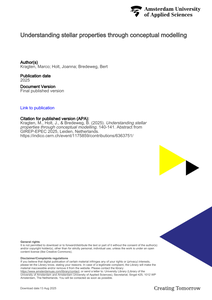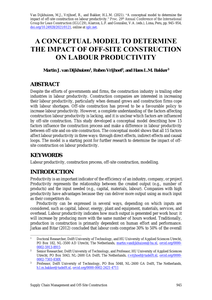We present the Stargazing Live! program comprising a planetarium experience and supporting lesson activities for pre-university physics education. The mobile planetarium aims to inspire and motivate learners using real telescope data during the experience. Learners then consolidate their learning by creating conceptual models in the DynaLearn software. During development of the program, content experts and stakeholders were consulted. Three conceptual model lesson activities have been created: star properties, star states and the fusion-gravity balance. The present paper evaluates the planetarium experience plus the star properties lesson activity in nine grade 11 and 12 classes across three secondary schools in the Netherlands. Learners are very positive about the planetarium experience, but they are less able to link the topics in the planetarium to the curriculum. The conceptual modelling activity improves the learners understanding of the causal relationship between the various stellar properties. Future work includes classroom testing of the star states and fusion-gravity balance lessons.
DOCUMENT
In this workshop we present three lesson activities to teach core (astro)physics concepts at pre-university level which students find difficult to grasp with traditional interventions: star properties, star states and the fusion-gravity balance. In each activity, students construct and simulate a conceptual cause-effect model. An evaluation study in nine Dutch classrooms showed that the star properties lesson significantly increased students’ understanding of the underlying causal relationships. The lessons were created as part of the Stargazing Live! project, which inspires students with an interactive planetarium lesson incorporating real astrophysical data before triggering deep learning with the conceptual modelling activities.
MULTIFILE

Occupational stress can cause health problems, productivity loss or absenteeism. Resilience interventions that help employees positively adapt to adversity can help prevent the negative consequences of occupational stress. Due to advances in sensor technology and smartphone applications, relatively unobtrusive self-monitoring of resilience-related outcomes is possible. With models that can recognize intra-individual changes in these outcomes and relate them to causal factors within the employee's context, an automated resilience intervention that gives personalized, just-in-time feedback can be developed. This paper presents the conceptual framework and methods behind the WearMe project, which aims to develop such models. A cyclical conceptual framework based on existing theories of stress and resilience is presented as the basis for the WearMe project. The operationalization of the concepts and the daily measurement cycle are described, including the use of wearable sensor technology (e.g., sleep tracking and heart rate variability measurements) and Ecological Momentary Assessment (mobile app). Analyses target the development of within-subject (n=1) and between-subjects models and include repeated measures correlation, multilevel modelling, time series analysis and Bayesian network statistics. Future work will focus on further developing these models and eventually explore the effectiveness of the envisioned personalized resilience system.
DOCUMENT

Artificial Intelligence (AI) offers organizations unprecedented opportunities. However, one of the risks of using AI is that its outcomes and inner workings are not intelligible. In industries where trust is critical, such as healthcare and finance, explainable AI (XAI) is a necessity. However, the implementation of XAI is not straightforward, as it requires addressing both technical and social aspects. Previous studies on XAI primarily focused on either technical or social aspects and lacked a practical perspective. This study aims to empirically examine the XAI related aspects faced by developers, users, and managers of AI systems during the development process of the AI system. To this end, a multiple case study was conducted in two Dutch financial services companies using four use cases. Our findings reveal a wide range of aspects that must be considered during XAI implementation, which we grouped and integrated into a conceptual model. This model helps practitioners to make informed decisions when developing XAI. We argue that the diversity of aspects to consider necessitates an XAI “by design” approach, especially in high-risk use cases in industries where the stakes are high such as finance, public services, and healthcare. As such, the conceptual model offers a taxonomy for method engineering of XAI related methods, techniques, and tools.
MULTIFILE

Despite the efforts of governments and firms, the construction industry is trailing other industries in labour productivity. Construction companies are interested in increasing their labour productivity, particularly when demand grows and construction firms cope with labour shortages. Off-site construction has proved to be a favourable policy to increase labour productivity. However, a complete understanding of the factors affecting construction labour productivity is lacking, and it is unclear which factors are influenced by off-site construction. This study developed a conceptual model describing how 15 factors influence the construction process and make a difference in labour productivity between off-site and on-site construction. The conceptual model shows that all 15 factors affect labour productivity in three ways: through direct effects, indirect effects and causal loops. The model is a starting point for further research to determine the impact of off-site construction on labour productivity.
MULTIFILE

Pressure on natural resources, unsustainable production and consumption, inequality and a growing global population lie at the base of the big challenges that people face. This chapter investigates how businesses can take responsibility in dealing with these challenges by means of frugal business model innovation. The notion of ‘frugal innovation’ was first introduced in the context of emerging markets, giving non-affluent customers opportunities to consume affordable products and services suited to their needs. Business modelling with a frugal mindset opens up a path that provides significant value while minimizing the use of resources such as energy, capital and time. Business models require intentional design if they are to deliver aspired sustainability impacts. Diminish or simplify resources can be described as the means to remove or reduce features, resources, required activities and/or waste streams. Decompose can be described as the removal of resources from the commercial value proposition and replacing them with resources the user/consumer already can access or uses. This is an Accepted Manuscript of a book chapter published by Routledge/CRC Press in Circular Economy : Challenges and Opportunities for Ethical and Sustainable Business on 2021, available online: https://doi.org/10.4324/9780367816650
DOCUMENT

The adoption of electric autonomous vehicles (EAVs) is set to revolutionize airport ground operations. Airports are increasingly developing new autonomous innovation strategies to meet sustainability goals and address future challenges, such as shifting labor markets, evolving working conditions, and the growing impact of digitalization [1]. The traditional business model, in which manufacturers sell vehicles to operators (ground handlers), may no longer be relevant. The increasing complexity and advancement of EAVs will drive up costs, making the ownership model less appealing and shifting the focus from product-oriented to service-oriented models. This paper aims to provide a conceptual framework for potential business models for the implementation of EAVs in airport airside operations.
DOCUMENT
Abstract: Existing frailty models have enhanced research and practice; however, none of the models accounts for the perspective of older adults upon defining and operationalizing frailty. We aim to propose a mixed conceptual model that builds on the integral model while accounting for older adults’ perceptions and lived experiences of frailty. We conducted a traditional literature review to address frailty attributes, risk factors, consequences, perceptions, and lived experiences of older adults with frailty. Frailty attributes are vulnerability/susceptibility, aging, dynamic, complex, physical, psychological, and social. Frailty perceptions and lived experience themes/subthemes are refusing frailty labeling, being labeled “by others” as compared to “self-labeling”, from the perception of being frail towards acting as being frail, positive self-image, skepticism about frailty screening, communicating the term “frail”, and negative and positive impacts and experiences of frailty. Frailty risk factors are classified into socio-demographic, biological, physical, psychological/cognitive, behavioral, and situational/environmental factors. The consequences of frailty affect the individual, the caregiver/family, the healthcare sector, and society. The mixed conceptual model of frailty consists of interacting risk factors, interacting attributes surrounded by the older adult’s perception and lived experience, and interacting consequences at multiple levels. The mixed conceptual model provides a lens to qualify frailty in addition to quantifying it.
DOCUMENT

Phd Thesis Higher professional education aims to prepare graduates for the complexity of professional practices. The development of conceptual understanding is important to deal adequately with this complexity, especially in an unstructured professional domain such as international business. The aim of this dissertation is to investigate the concept conceptual understanding in this professional domain, how it can be measured, what it looks like, how it changes, and in what ways it differs between students. The dissertation comprises five empirical studies for which data collection took place at a university of applied sciences in the Netherlands.
DOCUMENT

The presentation of management information on screens and paper is aimed at the initiation of control actions in order to bring about predefinied goals. The terms and concepts used in this control information can be interptreted in different ways. It is of vital importance that adequate definitions for these terms and concepts are provided, because of the area of tension betrween those that control and those being controlled. The creation of a common conceptual framework and the maintenance of concepts and definitions can be supported by the construction of an organization-specific lexicon and the use of modern IT tools.
DOCUMENT
